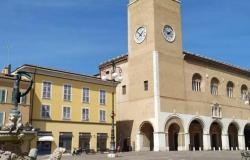If the tyrannicide of Pier Luigi Farnese had not occurred in 1547, would the fate of Piacenza have been better or worse? This was the question posed again at the end of the very well-attended presentation (Sala Panini was not sufficient to contain the audience present, which was partly diverted to Sala Verdi, video-connected) of Marcello Simonetta’s latest editorial effort: “PLAC – The Piacenza conspirators against the Farnese, Edition Bank of Piacenza, TEP Artigrafie print. A book which – Emanuele Galba recalled when introducing the author – closes the trilogy edited by the Florentine scholar for the local credit institute (“Pier Luigi Farnese. Life, death and scandals of a degenerate son” and “Gregorio and his brothers. The Casali di Monticelli protagonists of European diplomacy” the titles released in 2020 and 2021 respectively).
«History is not made with ifs and buts – the illustrious scholar answered the question – but there is no doubt that the Farnese family lost a battle with the killing of the Duke, but won the war because they subsequently returned to possession of Piacenza “eating” everything. Perhaps it would have ended differently if the imperial forces had managed to take Parma, but that was not the case. In that case your city would have remained the capital and would have followed the destinies of Lombardy. Instead, with their return the Farnese moved the center of gravity of the double Duchy to Parma, making Piacenza pay for the tyrannicide. It is a paradox, but this work tells of the failure of a successful conspiracy caused by the continuous provocations of the local feudal lords by Pier Luigi, who had received Piacenza and Parma as a gift from his father Pope Paul III”.
Before telling some of the many historical curiosities relating to the four Piacenza families (Pallavicino, Landi, Anguissola, Confalonieri, from whose initials the acronym PLAC derives which gives the publication its title), prof. Simonetta wanted to remember – as she also does in the book – two people who have left us: Corrado Sforza Fogliani (“without him we wouldn’t be here; he supported many cultural initiatives because his passion for knowledge and, in particular, for history”) and Marco Bertoncini (“it is thanks to him that I met President Sforza; without the mediation of this person of very fine intellect and exquisite culture, this book and my previous writings for the Bank they wouldn’t exist.” Of the aforementioned triad, this last work is the most Piacenza: not only because it deals with the local conspirators (the brothers Camillo, Girolamo and Alessandro Pallavicino, Agostino Landi, Giovanni Anguissola and Giovan Luigi Confalonieri), but also because from the documents of the Landi family (large producers of cured meats and cheeses) it emerges, for example, that in the 16th century what is now universally recognized as Grana Padano was called “Piacentino”.
What is being told is therefore a very internal story of the city of Piacenza, which revolves above all around the figure of Agostino Landi. «The mother was the Genoese Costanza Fregoso (relationships between Genoa and Piacenza were very close), who in 1509 married Marcantonio Landi. Agostino – explained the author – was born in Urbino in 1510 and then moved to Piacenza. At the age of sixteen he was invited to Padua by his godfather Pietro Bembo, a noble Venetian poet who provided him with a basic education. The boy showed himself to be intelligent and sensitive. Apparently he was good looking too. At 19, his father’s death forced him to abandon his literary leisure to dedicate himself to managing the vast family fortune. He married a cousin, Giulia Landi, and preferred to live outside the city, away from worldliness. Arriving in Piacenza, Duke Pier Luigi went against all the local lords, seizing properties and even isolating husbands from wives. Hence the organization of the conspiracy with the complicity of Ferrante Gonzaga, Spanish governor of Milan. The operation was successful and for a few years the noble families of Piacenza enjoyed the fruits of what had seemed like a great victory; the Landi became Princes by imperial will. Then things changed and with the return of the Farnese family the conspirators were forced into exile. Augustine died in strange circumstances, perhaps poisoned.” A final curiosity revealed by the professor is linked to the Landi. Simonetta: it is thanks to them that the Principality of Monaco exists today: in 1595, in fact, Maria Landi married Ercole Grimaldi, thus acquiring the princely title of the Monegasque family. A copy of the volume was reserved for those in attendance.
Tags: Tyrannicide Pier Luigi Farnese paradox failure successful conspiracy





